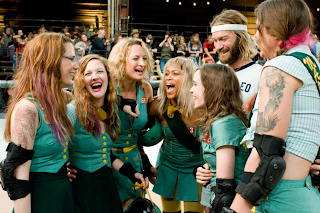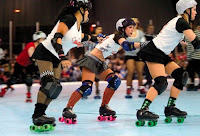
*This guest post also appears at I Will Not Diet.
I finally saw Whip It this weekend, and I have to say that the movie did not disappoint. I had low expectations because some people we trust had told us they didn’t like the film. I always think it’s better to go into the theatre with low expectations than high ones anyway because it makes it easier to enjoy yourself if you’re not sitting there thinking something like, I thought this was going to be the greatest movie ever made, but this dialogue is awful!
Maybe the movie was a little bit silly and predictable (and possibly not an accurate depiction of roller derby life), but, like I said, since I had low expectations, I didn’t even notice.
Because to me it didn’t feel predictable as much as relatable, and it didn’t seem silly as much as youthful and fresh. And the story is stand-up-and-cheer inspiring: teenage Bliss (played with loads of empathy and huge Bambi eyes by Juno‘s Ellen Page) has no agency or direction in life (and nothing that really makes her happy) until she sees two roller derby teams in nearby Austin shove it out one fateful night. After trying out for one team, she develops into a derby prodigy named Babe Ruthless who has as much drive and discipline as an Olympic athlete. In this way, it’s a wonderful girl empowerment story that will join the ranks of films like Girlfight and Bend it Like Beckham before it.
 But the reason I’m writing about the film is because I couldn’t help but notice that all of the actors looked so darned real, which I absolutely loved. They were all different shapes and sizes—Ellen Page’s Bliss was an adorable little french fry of a girl while her best friend Pash was a lovely roller coaster of valleys and curves. It was a much needed reprieve from the model thin blonde archetype we normally see on the big screen, especially in movies that are supposedly marketed towards women.
But the reason I’m writing about the film is because I couldn’t help but notice that all of the actors looked so darned real, which I absolutely loved. They were all different shapes and sizes—Ellen Page’s Bliss was an adorable little french fry of a girl while her best friend Pash was a lovely roller coaster of valleys and curves. It was a much needed reprieve from the model thin blonde archetype we normally see on the big screen, especially in movies that are supposedly marketed towards women. And the girls on the various roller derby teams were similarly diverse—sure, Drew Barrymore was in phenomenal shape, but some of the others—Kristin Wiig and Juliette Lewis included—looked their age and sported imperfect stomachs, thighs, and arms without an ounce of shame or self-consciousness. (It’s hard to be self-conscious, I suppose, when you’re skating around a roller rink wearing a short pleated skirt, a sleeveless, stomach-baring top, and fishnet stockings.)
But it wasn’t just their bodies that looked imperfect—it was also their hair (sometimes stringy or uninspired), their makeup (often greasy and overdone), and their skin (blemished on some occasions and wrinkled on others).
Of course, I credit the female director, Drew Barrymore, with keeping these women from looking artificial and plastic while still allowing them to look attractive and even hot. It makes perfect sense to me that it was Barrymore—an actress who’s gone through a variety of looks and dress sizes over the years—who felt comfortable letting these women look so true-to-life. In that way, the direction feels both emotionally and physically honest. And the movie is clearly better for it.
 For when Babe Ruthless and her cohorts take to the rink, it’s incredibly easy for those of us sitting in the audience to cheer for them because they look a lot more like us than most of the women we see staring back at us from that giant movie screen—more authentic than artificial, more lifelike than fantasy, more likeable than distasteful.
For when Babe Ruthless and her cohorts take to the rink, it’s incredibly easy for those of us sitting in the audience to cheer for them because they look a lot more like us than most of the women we see staring back at us from that giant movie screen—more authentic than artificial, more lifelike than fantasy, more likeable than distasteful.So I applaud Barrymore and her talented crew of actresses for baring not only their wonderfully diverse bodies but also their middle-aged and appealingly flawed faces.
And I encourage all of you to support Barrymore—and all female directors by extension—by taking your daughters and nieces to see this film (either now while it’s still in the theatre or later on DVD). After all, if we don’t support women who give us what we want, we have only ourselves to blame.
Molly McCaffrey teaches English and creative writing at Western Kentucky University. Her blog, I Will Not Diet, chronicles her effort to lose weight without unhealthy dieting and encourages readers to reject the notion that curvy women are not attractive. She has been nominated for a 2009 Pushcart Prize, and her work has appeared in Vestal Review, Word Salad, Cairn, Gravity Hill, Antipodes, Quirk, XX Eccentric: Stories about the Eccentricities of Women, and Gilmore Girls and the Politics of Identity.

I love this review!
I have plans to finally see Whip It tomorrow night and now I’m even more excited. YAY!
As a curly-haired, well-endowed woman I love that the film keeps it real, which is often an aspect of mainstream film that really irks me. Don’t get me started on all that “anti-curly rhetoric” out there…
Anyway, this couldn’t have been posted at a better time for me.
I really wanted to see this movie, but it came and went so quickly from theatres. Did anyone else read A.O. Scott’s NYT review (http://movies.nytimes.com/2009/10/02/movies/02whip.html), which spent the first few paragraphs basically bashing the film, only to go on to say that it was a pretty good, refreshing piece of entertainment. I wonder how many people got beyond those first few paragraphs?